Respiratory System
The respiratory system is responsible for taking in oxygen and expelling carbon dioxide from the body. It includes the nose, mouth, trachea, and lungs.
Key Components of the Respiratory System:
- Nose and Mouth: Air enters the body through the nose or mouth.
- Trachea: The windpipe that carries air to the lungs.
- Lungs: The main organs of the respiratory system where gas exchange occurs.
- Diaphragm: A muscle that helps with the breathing process.
Functions of the Respiratory System:
- Gas Exchange: Oxygen from the air is taken into the bloodstream, while carbon dioxide is released from the bloodstream into the air.
- Breathing: The process of inhaling and exhaling, which helps deliver oxygen to the body's cells and remove carbon dioxide.
- Smell: The nose is also involved in the sense of smell.
Study Guide:
Here are some key topics to study when learning about the respiratory system:
- The structure and function of the nose and mouth in the respiratory system.
- The role of the trachea in delivering air to the lungs.
- How the lungs facilitate the exchange of oxygen and carbon dioxide.
- The importance of the diaphragm in the breathing process.
- Common respiratory conditions, such as asthma and pneumonia.
Understanding the respiratory system is essential for grasping how our bodies take in and utilize oxygen. It is also important for understanding conditions that can affect breathing and overall health.
Good luck with your studies!
.◂Science Worksheets and Study Guides First Grade. Science in our world
Study Guide Science in our world
Science in our world  Worksheet/Answer key
Worksheet/Answer key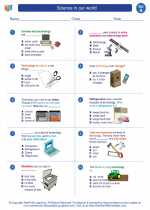 Science in our world
Science in our world  Worksheet/Answer key
Worksheet/Answer key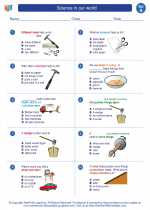 Science in our world
Science in our world  Worksheet/Answer key
Worksheet/Answer key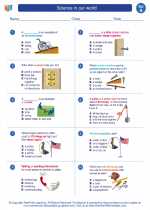 Science in our world
Science in our world  Vocabulary/Answer key
Vocabulary/Answer key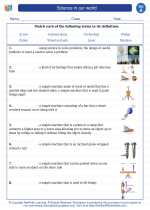 Science in our world
Science in our world  Vocabulary/Answer key
Vocabulary/Answer key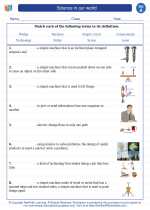 Science in our world
Science in our world 

 Worksheet/Answer key
Worksheet/Answer key
 Worksheet/Answer key
Worksheet/Answer key
 Worksheet/Answer key
Worksheet/Answer key
 Vocabulary/Answer key
Vocabulary/Answer key
 Vocabulary/Answer key
Vocabulary/Answer key

The resources above cover the following skills:
PHYSICAL SCIENCE (NGSS)
Waves and their Applications in Technologies for Information Transfer
Students who demonstrate understanding can:
Use tools and materials to design and build a device that uses light or sound to solve the problem of communicating over a distance.